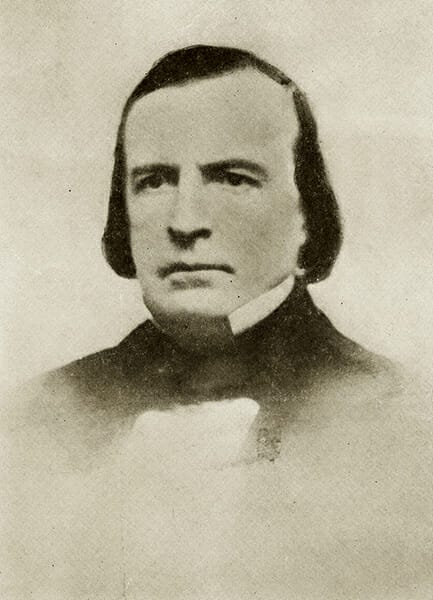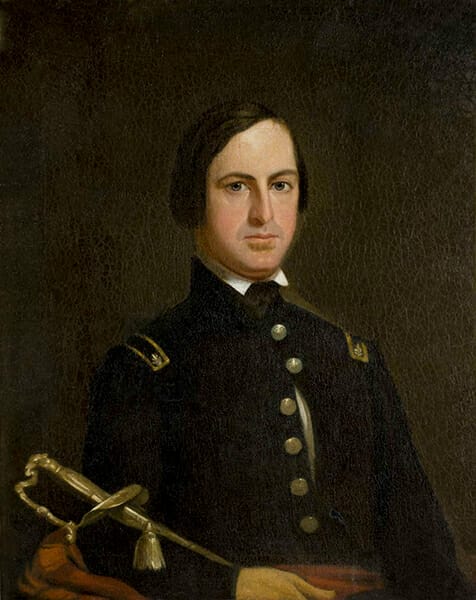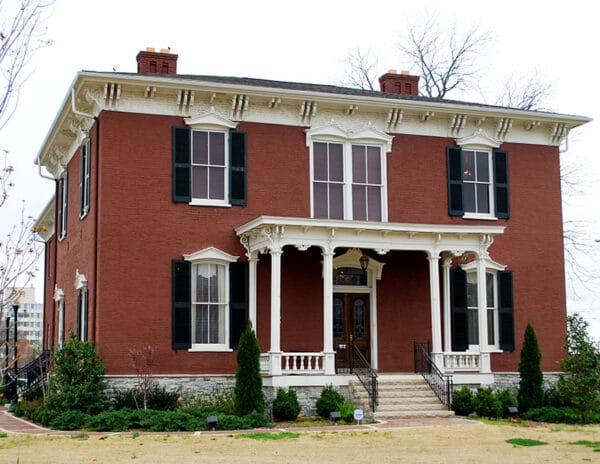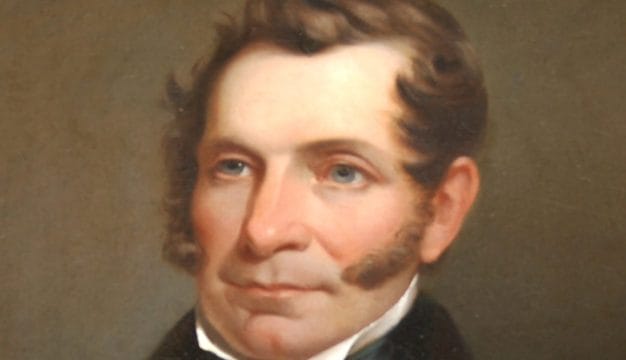Jeremiah Clemens
Jeremiah Clemens (1814-1865) was a politician, soldier, author, and delegate for Madison County to Alabama‘s secession convention, where he played a major, albeit unsuccessful, role in the effort to forestall immediate secession. Though he opposed the measure, he supported Alabama once the state seceded. When Union soldiers occupied north Alabama in the spring of 1862, Clemens switched sides and became an unwavering Unionist. In 1864, he campaigned for Pres. Abraham Lincoln’s reelection, prompting some contemporaries and historians to accuse Clemens of being too much of a political opportunist.
 Jeremiah Clemens
Jeremiah Clemens was born on December 28, 1814, in Huntsville to parents who moved to the Tennessee Valley from Kentucky. His father, James Clemens, was a merchant; his mother’s first name is unknown, but her maiden name was Mills. He was a second cousin to author Samuel Clemens, better known as Mark Twain. Clemens attended La Grange College in Florence, studied at the University of Alabama, and worked on his law degree at Transylvania College in Lexington, Kentucky. When he finished school, Clemens returned to Huntsville, where he married Mary L. Read on December 4, 1834. The couple had one daughter.
Jeremiah Clemens
Jeremiah Clemens was born on December 28, 1814, in Huntsville to parents who moved to the Tennessee Valley from Kentucky. His father, James Clemens, was a merchant; his mother’s first name is unknown, but her maiden name was Mills. He was a second cousin to author Samuel Clemens, better known as Mark Twain. Clemens attended La Grange College in Florence, studied at the University of Alabama, and worked on his law degree at Transylvania College in Lexington, Kentucky. When he finished school, Clemens returned to Huntsville, where he married Mary L. Read on December 4, 1834. The couple had one daughter.
In 1838, Pres. Martin Van Buren appointed Clemens to the position of U.S. Attorney for the District of Northern Alabama. Two years later, Madison County voters elected Clemens to the Alabama House of Representatives. Clemens was reelected in 1841 but left office for several months to raise a company of volunteers to fight against Mexican troops who were moving into Texas. He then returned to the legislature and served until 1844. In March 1847, Clemens again departed for Texas to fight in the Mexican-American War (1846-1848). He returned to Alabama in 1848, having achieved the rank of colonel in the U.S. Army. In 1849, he lost a bid for a congressional seat to Williamson Cobb of Madison County.
That same year, Alabama’s legislature elected the 35-year-old Clemens to the U.S. Senate to fill the vacancy left by the death of Dixon Hall Lewis. On the national level, his tenure in Congress was unremarkable. In the early 1850s, Clemens created controversy within Alabama over his vacillation on the Compromise of 1850, which he originally opposed. However, when his constituents supported its passage, he shifted sides. Some historians have noted that Clemens’s abrupt change caused his constituents to question his independence, and many came to view him as a political opportunist. Having lost favor within the Democratic Party, Clemens was not reelected.
 Jeremiah Clemens Portrait
When Clemens’s senatorial term ended, he returned to the South. In 1858, he moved to Memphis and eventually became editor of the Memphis Eagle and Enquirer. Clemens also began writing historical novels. In his first book, Bernard Lile, (1856) Clemens used his own experiences in Texas to weave a tale of a heroic man in pursuit of adventure during the Texas Revolution. In 1858, Clemens wrote Mustang Grey, based on his experiences in the Mexican War. In 1860, he penned The Rivals, which recounts the lives and events of Aaron Burr and Alexander Hamilton. Around this time, he moved back to Huntsville.
Jeremiah Clemens Portrait
When Clemens’s senatorial term ended, he returned to the South. In 1858, he moved to Memphis and eventually became editor of the Memphis Eagle and Enquirer. Clemens also began writing historical novels. In his first book, Bernard Lile, (1856) Clemens used his own experiences in Texas to weave a tale of a heroic man in pursuit of adventure during the Texas Revolution. In 1858, Clemens wrote Mustang Grey, based on his experiences in the Mexican War. In 1860, he penned The Rivals, which recounts the lives and events of Aaron Burr and Alexander Hamilton. Around this time, he moved back to Huntsville.
Clemens returned to politics during the secession crisis as one of Madison County’s two delegates to Alabama’s secession convention. As with all the delegates from North Alabama, Clemens aligned himself with the cooperationist viewpoint. Although there were different varieties of cooperationists, all agreed that Alabama should not immediately secede from the Union. Clemens advocated for a “wait and see” approach with president-elect Abraham Lincoln. He also supported a constitutional amendment guaranteeing that the national government would not interfere with slavery, unless the federal government did so on behalf of slaveowners. When the convention convened on January 7, 1861, Clemens and his fellow cooperationists were in the minority; the majority of the delegates favored immediate secession.
 Jeremiah Clemens House
As the leader of the cooperationist faction, Clemens attempted to persuade those favoring immediate action to keep Alabama in the Union. He called for a convention, with delegates from all of the southern states, to convene and debate secession. Those favoring immediate secession ignored his pleas. In a final attempt to thwart secession, Clemens demanded that a statewide referendum be held if the Ordinance of Secession passed. His efforts again fell on deaf ears, and no referendum was held. Alabama left the Union by a vote of 61-39. Though defeated, few cooperationists wavered in their commitment to their state; most, including Clemens, signed the Ordinance of Secession as a sign of unity.
Jeremiah Clemens House
As the leader of the cooperationist faction, Clemens attempted to persuade those favoring immediate action to keep Alabama in the Union. He called for a convention, with delegates from all of the southern states, to convene and debate secession. Those favoring immediate secession ignored his pleas. In a final attempt to thwart secession, Clemens demanded that a statewide referendum be held if the Ordinance of Secession passed. His efforts again fell on deaf ears, and no referendum was held. Alabama left the Union by a vote of 61-39. Though defeated, few cooperationists wavered in their commitment to their state; most, including Clemens, signed the Ordinance of Secession as a sign of unity.
In the early days of the war, Clemens was commissioned a major general of the Army of Alabama. He soon resigned, however, when the establishment of the Confederate Army essentially nullified his position. In the spring of 1862, upon the Union’s occupation of North Alabama, Clemens switched his loyalties to the Union. Although he was vilified by pro-Confederate Alabamians, Clemens worked diligently to reunite Alabama with the Union. When numerous North Alabamians became disenchanted with the war, Union meetings began cropping up across the region. Clemens presided over such a meeting in Huntsville in early 1864. He also offered advice to President Lincoln on how best to deal with Alabama during Reconstruction.
Clemens would live just long enough to see Alabama return to the Union. Stress, war, and failing health were beginning to take its toll. He did produce one more book, Tobias Wilson (1865), on partisan warfare in North Alabama during the Civil War. Of all his books, this novel received the most critical acclaim. Clemens died on May 21, 1865, and was buried at Maple Hill Cemetery in Huntsville. Jeremiah Clemens is remembered as a competent Democratic politician, despite his shifting loyalties during the secession crisis and the Civil War. Clemens’s greatest influence on Alabama lies with his opposition to immediate secession, initially supporting the Confederacy, and his efforts as a Unionist to reintegrate Alabama into the United States.
Additional Resources
Bedsole, Virgil. “The Life of Jeremiah Clemens.” Master’s thesis, University of Alabama, 1934.
Hettle, Wallace. The Peculiar Democracy: Southern Democrats in Peace and Civil War. Athens: University of Georgia Press, Athens, 2001.
Watson, Elbert L. Alabama United States Senators. Huntsville, Ala.: Strode Publishers, 1982.



